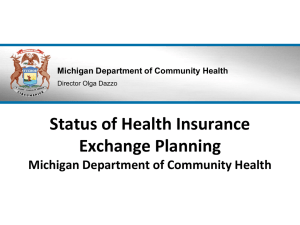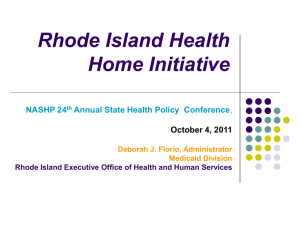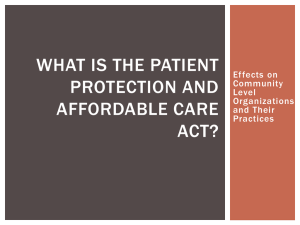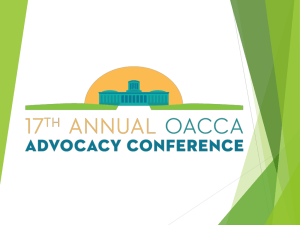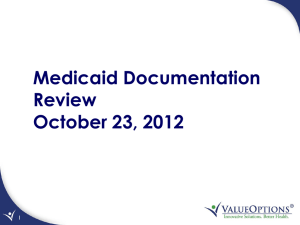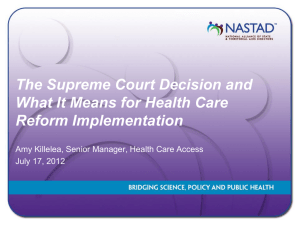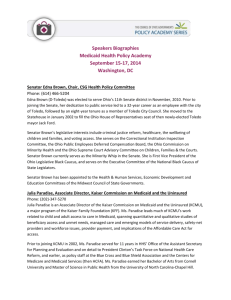Keith-Martin-Medicaid-Reform-and-Expansion-option
advertisement
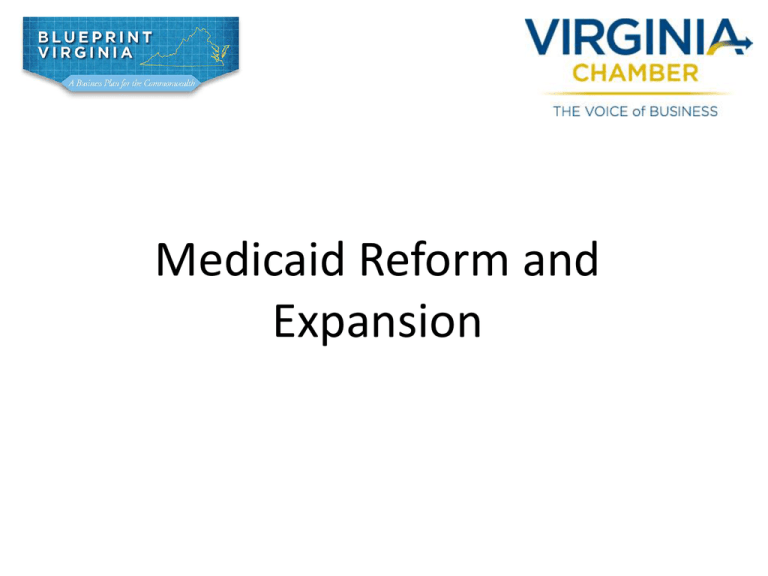
Medicaid Reform and Expansion Background: • The Patient Protection and Affordable Care Act (PPACA) was signed into law in March 2010. • In June 2012, U.S. Supreme Court upheld the individual mandate provision of the health care reform law. • However, the Court also declared that states could not be forced to expand Medicaid eligibility as the law initially required. • As a result, states can opt out of the Medicaid expansion program. • If states do expand Medicaid, the federal government will fund 100 percent of Medicaid coverage for newly eligible individuals for the first two years, then gradually dropping their share to 90 percent by 2020 and thereafter. Background: • Since the Court’s ruling, many states have wrestled with the question of whether to expand their Medicaid programs. To date, 24 states are moving forward with expansion; another 21 are not. Six states are still considering expansion. – Participation through an alternative expansion model—Arkansas has gotten and Indiana, Iowa and Oklahoma are seeking federal approval to extend coverage to expansion-eligible residents through private insurance, state insurance exchanges or enrollment into the state’s health plans. • In Virginia, the General Assembly and the Governor have laid out the path forward for Medicaid expansion that requires the Medicaid Innovation and Reform Commission to study the feasibility of expansion and how to best streamline Virginia’s health care system to correspond to the PPACA. Medicaid Innovation and Reform Commission: The path to expansion runs through the new Medicaid Innovation and Reform Commission that will oversee three major phases of reform that are necessary to move forward: • Continue reforms that are currently underway. • Implement innovations in service delivery, administration and beneficiary engagement. • Design a cost effective and coordinated delivery system for all Medicaid patients. Once the Commission agrees that the conditions of the reforms have been met, the Commonwealth can offer coverage to more than 400,000 eligible Virginians without health insurance and collect federal dollars that are available to help pay for Medicaid expansion. Medicaid Expansion Concerns: • Impact on the Commonwealth’s budget • Increase costs • Federal government’s ability to continually pay their share of expansion Business Case for Medicaid Reform and Expansion: • Taxes – Under the PPACA, Virginia businesses and individuals will be taxed an additional $10 billion over the next 5 years. – If Virginia does not opt to extend Medicaid coverage in the state, we will be subsidizing Medicaid expansion in other states. • Economic Impact – Medicaid expansion. • Would provide up to $3.9 billion boost to the Virginia economy annually. • Create more than 30,000 jobs. Business Case for Medicaid Reform and Expansion: • Hidden Health Care Tax – Due to cost shifting as a result of uncompensated medical care, businesses, as the primary purchaser of health insurance, are paying a hidden tax that makes their health insurance premiums higher than they should be. The estimated cost savings in insurance premiums for Virginia businesses as a result of Medicaid expansion is approximately $20 million per year for the next 5 years. • Reforms – Essential to reduce duplicative or unnecessary services and streamline the administrative process. – Critical to ensure the long-term sustainability of the Medicaid program. – Important to improve health outcomes.


